By Mary Beth Tinker
This February 24th marks 55 years since the U.S. Supreme Court ruled in Tinker v. Des Moines that “state operated schools may not be enclaves of totalitarianism” and that public school students are “persons under our constitution, possessed of fundamental rights,” as Justice Abe Fortas wrote for the 7–2 majority.
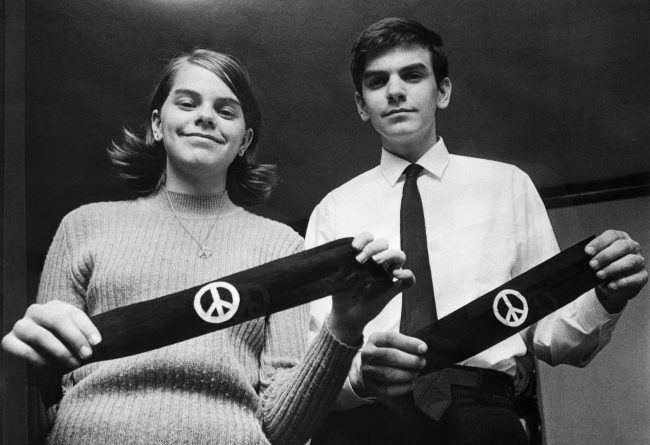
Mary Beth Tinker and her brother, John, display two black armbands, the objects of the U.S. Supreme Court’s agreement March 4th to hear arguments on how far public schools may go in limiting the wearing of political symbols. The children, Mary Beth at Harding JHS and John at North HS, were suspended from classes along with three other students for wearing the bands to mourn the Vietnam war dead. Source: Bettmann Archive via Getty Images
I was one of the student plaintiffs in the case. When I was 13, a group of us were suspended from school in Des Moines, Iowa, for wearing black armbands to mourn the dead of the Vietnam war and support a Christmas truce. When the Iowa Civil Liberties Union challenged the suspensions in court and won, they scored a major victory for the rights of K–12 students, whose free speech issues are often overshadowed by those of college and university students.
Students need freedom of speech in order to advocate for their interests and discuss the issues of their lives. But there are other rights that need to be respected, rights that may be even more fundamental. I saw one of those rights violated again and again when I worked as a pediatric trauma nurse: the right not to be shot.
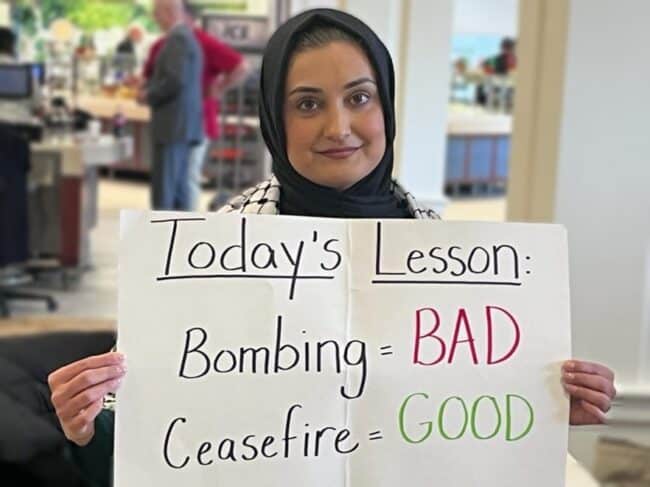
Atefeh Rokhvand, of Teachers Against Genocide, with a lesson she brought to legislators on Capitol Hill on Dec. 13, 2023. Photo by Deborah Menkart.
Gaza youth have rights too, including the right not to be shot also, or starved, or traumatized by the bombings that they have endured for years. I admire U.S. students who use their free speech rights to stand up for Gaza and call for a ceasefire, which is the road to peace for Israeli youth as well. They also have a right not to be traumatized by violence and war.
But again, the United States has vetoed a ceasefire, again youth will pay the price.
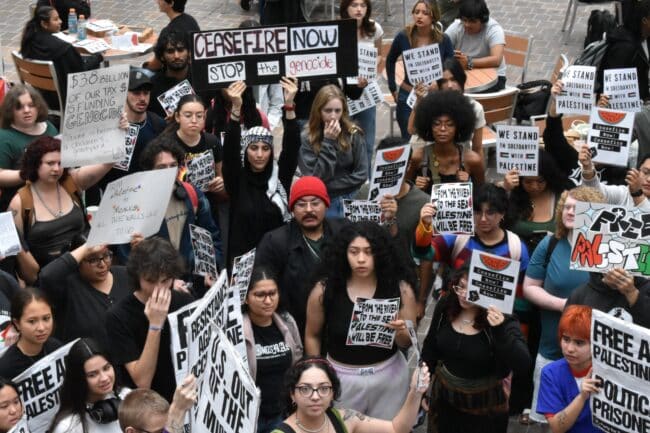
UTSA students gather holding signs in support of Palestinians and demanding a ceasefire in Gaza. By Josh Peck/TPR
I admire youth who speak up about these things because I know how hard it can be to do that. My family faced threats that our house would be blown up on Christmas Eve, people threw red paint at our house, and a woman called to threaten me, saying, “I’m going to kill you.”
Two years before this, some of us had worn armbands to mourn for four Black girls in Birmingham, Alabama, murdered at the 16th Street Baptist Church after the Birmingham Children’s Crusade. The crusade was the Black Lives Matter of that time, and we admired their actions even as we learned of the possible risks.
When we wore our armbands for peace in Vietnam, we were called “Communists” and “pinkos” and received postcards telling us to “go back to China or Russia.” But we weren’t anti-American, we just disagreed with government policies, especially the atrocities in Vietnam. We knew that speaking up and using one’s rights makes a country better.
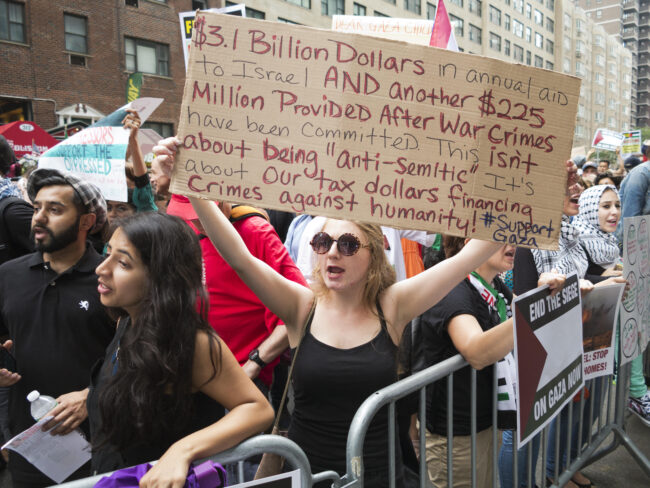
Demonstration at Columbus Circle in New York City protesting Israeli attacks against Gaza, August 1, 2014. The date on this photo is a reminder that this is a decades long struggle. Source: Alamy
Now, students who protest the war on Gaza are threatened or called “antisemitic.” But criticizing the policies of Israel and the United States does not make a person antisemitic any more than speaking up for peace in Vietnam made us anti-American. In fact, Jewish students are criticizing the actions of the governments of the United States and Israel because they are against unjust policies.
Speaking up can seem hard for adults too, including ones who should know better, like me. In 2002, a friend spoke about Palestinian rights at a high school outside Boston. For doing that, her future talks were cancelled. I realized that Palestinian rights was one of the most controversial subjects to be mentioned in schools, at least in the United States. I did go on to take a few actions supporting Palestinian rights, but I was more hesitant to speak about the issue in schools. The chilling effect had worked on me, just as intended.
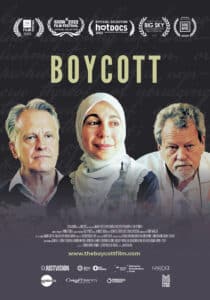 In 2017, as I was preparing to attend a conference of the Kansas Student Press Association, I was told that in order to attend, the state required me to sign a statement that I was not boycotting Israel. I knew that it violated my rights, but as I rushed to get ready for my trip, I signed. Thankfully, a math teacher, Esther Koonz, had the moral clarity to refuse. Her ACLU case would end the requirement, at least in Kansas. You can learn more about this issue in the amazing film, Boycott.
In 2017, as I was preparing to attend a conference of the Kansas Student Press Association, I was told that in order to attend, the state required me to sign a statement that I was not boycotting Israel. I knew that it violated my rights, but as I rushed to get ready for my trip, I signed. Thankfully, a math teacher, Esther Koonz, had the moral clarity to refuse. Her ACLU case would end the requirement, at least in Kansas. You can learn more about this issue in the amazing film, Boycott.
When students ask me what the greatest threat to free speech is, I know there are many. But I say “self- censorship.” I have experienced it, especially when it comes to speaking up for the rights of Palestinians. But for me, and for millions of Americans, that is about to change.

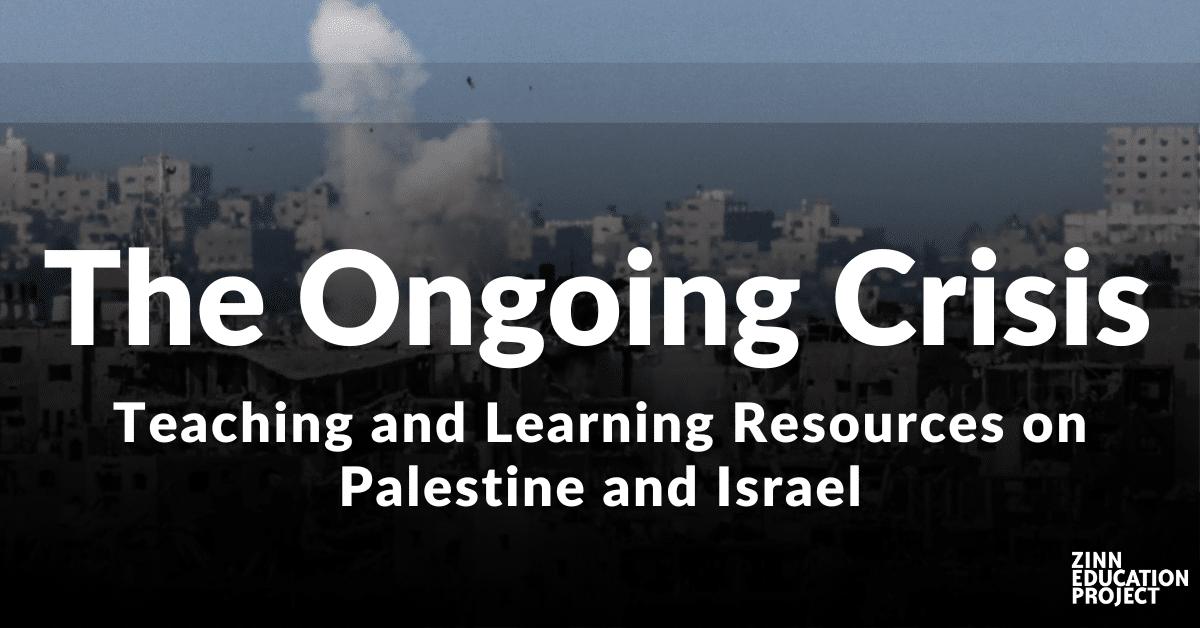
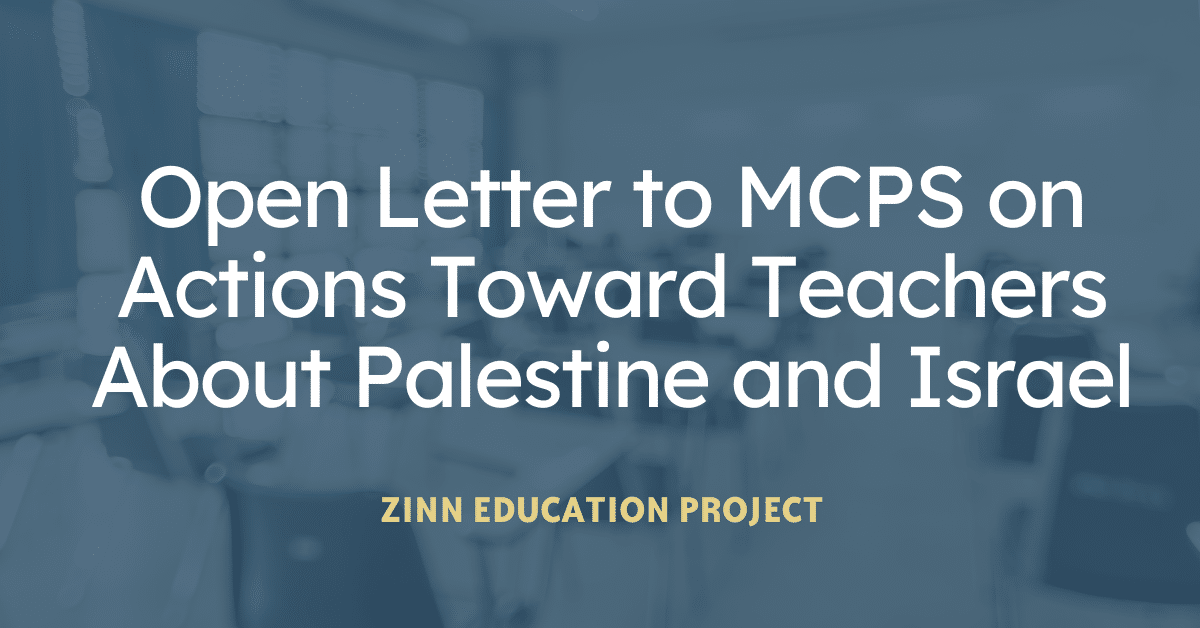





Twitter
Google plus
LinkedIn